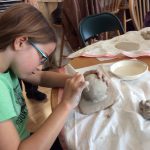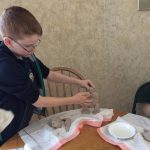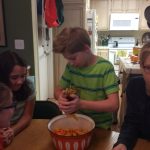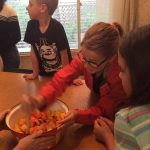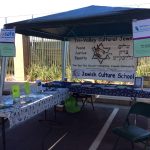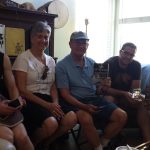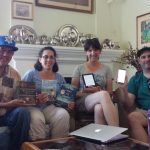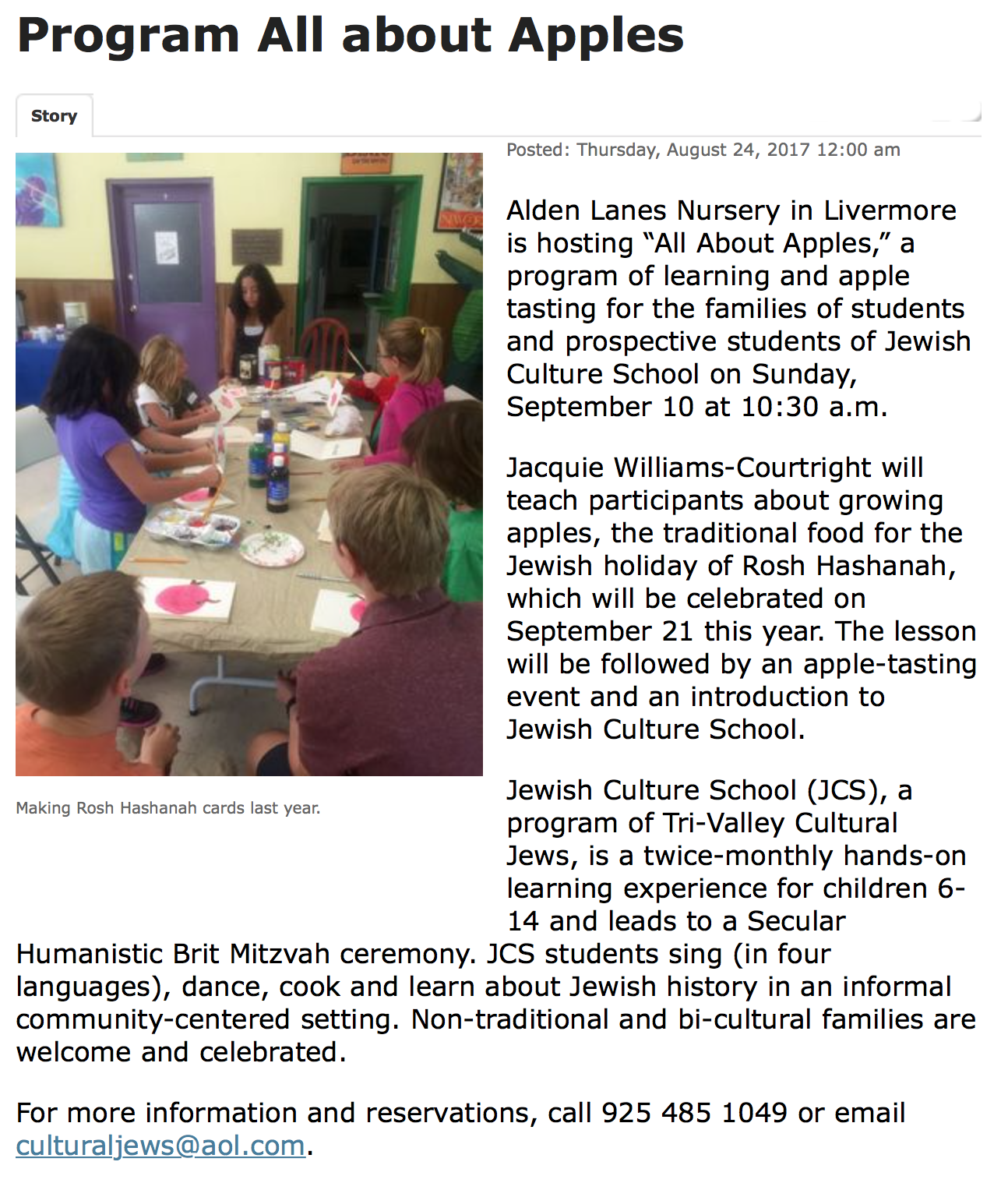
Category: Announcements
Video Seminar: Roots of Secular Humanistic Judaism
TVCJ Fourth Annual Book Review
Everybody loves some nice, relaxing summer reading… Here are recommendations from some of our members. You’ll find a book for just about every reading preference out there.
You can click on any title to be taken to an Amazon page to order that book.
Younger Readers
Robert – J. K. Rowling, Harry Potter and the Half-Blood Prince
Robert liked that [redacted – spoiler!] and that people die when you least expect it. He would recommend the whole series.
Evie – J. K. Rowling, Harry Potter and the Goblet of Fire
She liked that it was full of mystery and magic. She would recommend the whole series.
Joey – Jack Thorne, Harry Potter and the Cursed Child
This original play is a sequel story to the Harry Potter series. It tells the story of one of Harry’s children. It has some of the same qualities as the series. Joey and Colin both recommend it.
Colin -Rick Riordan, Blood of Olympus
This was a good finish to the Heroes of Olympus series. He recommends reading the whole series. Riordan creates fictional modern story around Greek mythology. It would be good for upper elementary to adult.
Alex – Chris D’Lacy, The Dark Wyng
This is the second book in the Erth Dragons series. Similar to Tolkien’s world, the setting has a history and the characters are very well-written. It is a good sequel to the first book. It would be good for middle-schoolers.
Isaac – Art Spiegelman, Maus
This is a graphic novel that tells the story of the Holocaust with cats and mice. It is a very good book.
Adult Readers
Emma – Lara Vapnyar, Still Here
This story is about four Russian immigrants who move to New York City. One of the characters creates an app that allows people to talk to their dead relatives. The app creates a debate about how to handle death and about online presence. Another theme of the book is being an immigrant.
Derek – David Lebovitz, My Paris Kitchen
Trained under Alice Waters, Lebovitz moved to Paris 10 years ago and writes this book about his culture shock when his American food training clashes with his experiences in Paris.
Amy – John Lewis, March
This three book graphic novel tells Congressman John Lewis’s experience of the Civil Rights Movement, culminating in the inauguration of Barack Obama. It is a good reminder that changing laws isn’t enough to change society.
Jane – Frederik Bachman, A Man Called Ove
This story is about an older man whose wife passes away. The themes are people’s need to be connected to other people in their communities and finding one’s purpose in life.
Jane and Mitch –
Edward Rutherfurd, New York: The Novel; Paris: The Novel; London: The Novel
Each novel covers the story of the city, and then finds an early family to follow through the development of the town. For example, New York starts with the native peoples. Mitch enjoyed getting into the history of how the city developed.
Leah – Uval Noah Herari, Sapiens: A Brief History of Humankind
The book goes back to Neanderthals and other early human species. It adds human sociology and psychology to show the nuances of how we developed our social structures. For example, it discusses the changes that agriculture made for human life. It also goes into the roles of mythology, gossip, and government as a way to bring people together.
David – James Joyce, Ulysses
This challenging novel about a day in Dublin works on a lot of different levels. It is written in stream of consciousness, but then one chapter reads like an 1860s newspaper while other chapters are lyrical. Each chapter is written in a different style. It is a challenging but rewarding read.
Bret – Claire North, The First Fifteen Lives of Harry August
In this fictional novel, which is a bit like Groundhog Day, a character restarts his life each time he dies. He encounters people who are like him and discovers that the world is ending because of the actions of another like him.
Kelly – Paul Kalanithi, When Breath Becomes Air
This true story is written by an accomplished young neurosurgeon who finds out he has terminal lung cancer. He describes the early part of his life and career and what it is like to be a neurosurgeon, and then finally deals with his cancer, coming to terms with how to handle the time he has left and how to make peace with his own death.
Scott – Gary Keller, The One Thing
This non-fiction book talks about prioritization, cutting through the clutter, and asking the right questions so we can focus what matters. A good quick read that helps for both work and home.
Judy – Claire North, Touch
This intriguing novels is narrated by a mysterious individual who body-hops.
Judy – Lorna Landvik, The Tall Pine Polka
This delightful story about small town people taught Judy the important lesson not to “write off” (so to speak) an author just because you don’t like his/her other works. A different book by that same author might be a great read!
Art in Culture School
This Sunday our culture school students created art in the style of Marc Chagall. They learned about the Jewish folklore in his images.
JCS activity
Today the older Jewish Culture School students focused on images of the Jews in the art of the Middle Ages in Europe as a way to talk about stereotypes and propaganda that reinforces them. The students saw pictures of Jews with large hooked noses and ugly expressions meeting with Jesus, who looks like a white European, although he should have looked like a Jew. The students learned how stereotypes are used to divide people and discussed current events with this in mind. Then they made their own art depicting Jews. Of course, all of them are different!
The younger class talked about some famous Jews namely, Emma Lazarus and Albert Einstein and what it means to be part of the larger Jewish family that includes them.
Jewish Culture School
Our students made two pots of tsimmis using different ingredients. Stidents discovered the concept of “too much of a good thing” when they added a LOT of honey to one pot!
Castro Valley Pride Festival
TVCJ was proud to be at Castro Valley Pride festival again this year. As one of our members put it, “When anyone is oppressed, Jews have to stand up!” We shared in the opening invocation and the reading of the names of the Orlando victims and enjoyed strolling around to meet the other vendors and organizations. Tthe ambiance was relaxed and a lovely time was had by all.
TVCJ’s Jewish Culture School
Video by Emma Greenberg.
TVCJ Third Annual Book Review
Summertime and the living can be a little boring if you don’t have a good book… Peruse our recommendations and find something to read in the shade. You’ll find a book for just about every reading “taste” out there.
You can click on any title to be taken to an Amazon page to order that book.
Amy read, or rather listened to, Unfaithful Music and Disappearing Ink by Elvis Costello. It was great to hear about how he crafted his art, worked with other legendary musicians, and even convinced Paul McCartney to dust off an old guitar. Amy loved hearing Elvis tell his own story on the audio version.
Joy read The Book Thief by Markus Zusak. She found the perspective unique, as the story is narrated by Death, and the main character is a German (not Jewish) girl in Nazi Germany. Joy appreciated the author’s interesting way of writing.
Joy also recommends The Night Manager by John Le Carré, based on a true story of international espionage. The night manager at a hotel has a quest to expose a guest who is known for weapons smuggling. (Joy said the television movie based on this book has been changed and modernized.)
Karen read Maus by Art Spiegelman. This is a pair of graphic novels about the author’s parents and their story about what happened after Germans invaded. The books go back and forth in his father’s life between the 30s and 70s with characters represented by different animals.
Karen also shared The Lacuna by Barbara Kingsolver, a story that takes place first in 1930s Mexico, including interactions with Frida Kahlo and Diego Rivera. The second half of the book has the central character returning to the U.S during the McCarthy era.
David read Ulysses by James Joyce, just to challenge himself to get through it. He found it “very fun”, and says it’s the first time he’s written notes in a book. Each individual chapter uses a different writing technique; for example, when writing about the Sirens, Joyce begins in a free verse poem, which gradually collapses into structured narrative text.
Judy recommended FOUR books (and kept her reviews succinct, as usual). First came Safekeeping by Jessamyn Hope. Judy likes that this book takes place in the 80s, as it speaks to a time that she has affinity to (and says it’s also just a really good book).
The Blood of Flowers by Anita Amirrezvani is about a poor Persian girl in the 1600s who becomes a rug weaver, describing how she lived, what she’s subjected to, and interspersed with stories that other characters put into it.
The Rent Collector by Camron Wright: Judy wasn’t sure she was going to like this one, but she got sucked in as it got better and better. She says it has an amazing twist that made sense, but you don’t see it coming.
Seraphina by Rachel Hartman is Judy’s enthusiastic YA recommendation. Seraphina is a dragon, different than any other dragons in other books you’ve read.
Rebecca read The Trials of Apollo by Rick Riordan (first book in a series). Apollo the Sun God has a quest but doesn’t know how to carry it out.
Second, Rebecca reviewed Serafina and the Black Cloak by Robert Beatty. This is the story of a girl who knows that children have disappeared, and she has to discover how she is going to help. This book also has a sequel: Serafina and the Twisted Staff.
Finally, Rebecca read Daniel’s Story, by Carol Matas, a book purchased at a Holocaust museum from the children’s exhibit. Daniel tells the story of his family’s journey, explaining pictures he has in an album and in his memory. This is a sad book, but Rebecca liked it and recommends it.
Solomon read Atonement, by Ian McEwan, a story about guilt and forgiveness. He had fun with the underlying idea of writing, narrating, narrative structure, and the omniscient point of view. It’s grim but it’s really good.
Mornings in Jenin by Susan Abulhawa is a thought-provoking novel about the Israeli/Palestinian conflict from a Palestinian lens. It covers the characters’ actions, reactions, and motivations in depth.
Leah recommends audiobooks for anyone who has a long commute! She listened to Earthing by Clinton Ober and Dr. Stephen T. Sinatra. This is a non-fiction book about the idea that we are no longer grounded or connected to the earth, as we have layers of concrete, rubber-soled shoes, etc. keeping us disconnected. The theory says this affects us in a variety of negative (no pun intended) ways, including building up toxins and interfering with sleep.
For One More Day by Mitch Albom is about death, like many of this author’s books. The main character laments the loss of his mother, whom he never appreciated as he struggled to earn his father’s love. He leads a troubled life and has the chance to reconnect to his mother, who comes back as a sort of ghost figure.
Finally, Leah says The Signature of All Things by Elizabeth Gilbert is especially good if you like gardening and planting. The main character follows in her father’s footsteps, becoming a botanist. Spans much of the 19th century.
Leslie read Soy Sauce for Beginners by Kristin Chen. 30-year-old Gretchen Lin leaves SF and husband to return to Singapore. She finds herself dealing with the problems of an alcoholic mother and her father’s family soy sauce business. A story for foodies of love and relationships. Gretchen has to decide whether to return to her husband or take over the family business.
Jerry read The Berlin Boxing Club by Robert Sharenow. This is a historical fiction story of a secular Jewish teenager, pre-WWII. He experiences harassment by non-Jews, even though he never identified with Judaism. His father has some connections and gets famous boxer Max Shmelling to give him lessons. The book is about the boy’s relationship with Max, or the relationship he hoped to have with him.
Jerry also read and recommends Through the Door of Life by Joy Ladin, a formerly male orthodox Jewish professor who found out she is female and came out as transgender.
Brett read The Martian by Andy Weir (also recommended last year). “Robinson Crusoe on Mars”: An astronaut is marooned on Mars, and this is his saga of survival, being resourceful, and coping with extreme loneliness. Told in journal format, with a very humorous voice. (Noah also recommends the audio version.)
Brett’s other recommendation was The Nexus Arc trilogy by Ramez Naam. A near-future science fiction series about what happens when people can communicate brain to brain. This raises questions about mind malware, empathy over distance, and societal resistance to change.
Kelly recommends the graphic novel Persepolis by Marjane Satrapi, a (non-fiction) memoir of a young girl living during the Iranian revolution.
Kelly also liked A Tyranny of Petticoats, edited by Jessica Spotswood. The editor commissioned 15 short stories about powerful young women in various historical fiction contexts. The collection includes stories from the revolutionary war, the civil war, and the 60s, some mythical or with mythical beings. Kelly says it’s a little uneven, but some of the stories are very engaging, particularly for younger (YA) readers.
Jamie read All the Light We Cannot See by Anthony Doerr (also recommended last year). These are two, eventually intertwined stories in Nazi-occupied Paris, one about a blind girl and one about an orphaned boy who gets involved with the Hitler youth. The author does a great job of bringing the two stories together.
Jamie and Sophia read The Trumpet of the Swan by E.B. White together. It’s a sweet book about wildlife and nature. A mute swan has to go into town to make money.
Carol recommends The Art of Fielding by Chad Harbach. It’s a novel about a naturally talented shortstop, recruited by a small-town college and struggling with self-doubt, as well as other complicated characters including his teammates and the college president.
Arcadia by Lauren Groff is a novel that starts in a utopian commune in the 70s, told from the perspective of Bit, who is born on the commune and has to shift his perspective as he grows older and eventually joins the outside world.
The Sixth Extinction: An Unnatural History by Elizabeth Kolbert is a non-fiction work chronicling the Earth’s five mass extinctions, and giving evidence that we are currently in a sixth extinction, caused by human beings. A bit scary, but fascinating.
Noah loved The First Fifteen Lives of Harry August by Claire North. Science fiction about a small population of people (the Cronus club) living throughout history – after death, they find themselves reborn with all of their cumulative memories and the ability to make changes. They figure out a way to pass messages to each other through time. The story opens with Harry about to pass away (and be reborn), when he receives the message that the world is ending and his help is needed.
11/22/63 by Stephen King is not a horror book. A contemporary high school English teacher stumbles into a portal that always leads to the same date in 1957. He is set on a mission by a mentor and friend to go back and prevent the death of Kennedy.
Wendy read The Bonesetter’s Daughter by Amy Tan, another beautiful Tan novel about several generations in a Chinese-American family, telling different stories about their lives, and going back and forth in time.
Isaac also read and recommends The Book Thief. He actually saw the movie first, but liked the (very long) book better.
Isaac also enjoyed The Outsiders by S.E. Hinton. This is a story that takes place in the sixties about two rival gangs, the Greasers and the Socs. The rich-kid Socs can do whatever they want, including beating up on the poorer Greasers.
Atheism 2.0
An interesting segment of this week’s TED Radio Hour on NPR. In this segment, Alain de Botton explains what he calls “Atheism 2.0”. It sounds quite similar to what TVCJ does. Click this link and then click on “Listen to the Story”.
http://www.npr.org/2013/11/22/245957052/what-can-atheism-learn-from-religion




